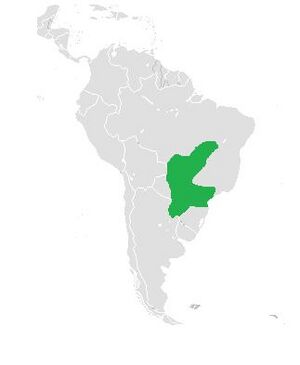Vanderhaege's toad-headed turtle facts for kids
Quick facts for kids Vanderhaege's toad-headed turtle |
|
|---|---|
| Conservation status | |
| Scientific classification |
|
| Kingdom: | Animalia |
| Phylum: | Chordata |
| Class: | Reptilia |
| Order: | Testudines |
| Suborder: | Pleurodira |
| Family: | Chelidae |
| Genus: | Mesoclemmys |
| Species: |
M. vanderhaegei
|
| Binomial name | |
| Mesoclemmys vanderhaegei (Bour, 1973)
|
|
 |
|
| Script error: The function "autoWithCaption" does not exist. | |
| Synonyms | |
|
Synonymy
|
|
Script error: No such module "Check for conflicting parameters".
The Vanderhaege's toad-headed turtle (Mesoclemmys vanderhaegei) is a special type of turtle. It belongs to the family called Chelidae. This turtle is found only in South America. It's known for its unique appearance, especially its head, which looks a bit like a toad's.
Contents
What's in a Name?
This turtle is named after Maurice Vanderhaege. He was an expert at raising reptiles, like turtles, in special enclosures called terrariums.
What Does It Look Like?
Vanderhaege's toad-headed turtle can grow up to 27 cm (11 in) long. That's about the length of a school ruler! Its shell, called a carapace, is oval-shaped. It has a slight groove down the middle. The shell is usually widest near the back.
The shell can be brown, gray, or black. The bottom part of the shell, called the plastron, is yellow. It often has brown or black patterns on it. The turtle's head and neck are gray. Its throat and chin are yellow. Sometimes, its head might have orange markings.
How to Tell Males from Females
- Males have tails that are a bit longer and thicker. Their vent (where waste comes out) is closer to the tip of the tail.
- Females have a less deep notch on their plastron.
Where Does It Live?
This turtle lives in southern Brazil, Paraguay, and northern Argentina. It might also be found in Bolivia and Uruguay. These turtles prefer rivers and swamps that have lots of plants.
Daily Life of the Turtle
Vanderhaege's toad-headed turtle is active during the day. It is a carnivore, which means it eats meat. Some experts have described these turtles as being quite aggressive. They can have a fierce temper.
Reproduction
Female Vanderhaege's toad-headed turtles lay oval-shaped eggs. Each egg is about 35 mm × 28 mm (1.4 in × 1.1 in) in size.
Conservation Status
The IUCN Red List (a list of threatened species) says this turtle is "Lower risk: near threatened." This means it's not in immediate danger, but its population needs to be watched carefully.
 | Janet Taylor Pickett |
 | Synthia Saint James |
 | Howardena Pindell |
 | Faith Ringgold |


